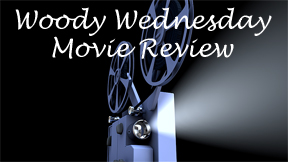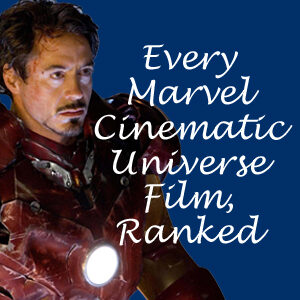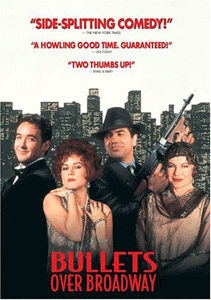Woody Allen’s 1920s theater-meets-the-Mob farce “Bullets Over Broadway” (1994) is a well-written screenplay from a great concept, peppered with funny performances and premises. Yet it doesn’t rank among his elite films for an odd reason: the direction.
Allen (co-writing with Douglas McGrath) chooses to direct in the style of a stage play, with long takes. But he doesn’t hold out for perfect takes, as you can do in film. He’s content with lots of stepped-on and/or slightly flubbed lines, like you might see in community theater. This approach even comes at the expense of great zingers; some go almost unnoticed because the delivery and editing aren’t in place to help the zing.
Broadbent goes broad
Still, “Bullets” did grow on me as it went along. Jim Broadbent is the ensemble’s standout as Werner Purcell, who is initially a refined, polite thespian, asking only for hot water and lemon in his dressing room. Inexplicably and increasingly hilariously, he starts chowing down at the crafts table throughout rehearsals.

“Bullets Over Broadway” (1994)
Director: Woody Allen
Writer: Woody Allen, Douglas McGrath
Stars: John Cusack, Dianne Wiest, Jennifer Tilly
I laughed out loud when Werner pauses amid disrobing for a post-rehearsal tryst with co-star Olive Neal (high-pitch-voiced Jennifer Tilly in a totally expected role) to chomp on a drumstick he somehow had tucked away.
Werner is the male lead of “God of Our Fathers,” by struggling playwright and first-time director David Shayne (John Cusack). It’s funded by Mobster Nick Valenti (Joe Viterelli) because he wants to get his woman, Olive, a chance to act outside of burlesque houses.
Like a lot of Allen’s show-biz farces, we see the funny premises gradually develop in “Bullets” while most of the actors play it relatively straight. My favorite thread is when hitman Cheech (Chazz Palminteri) becomes emotionally invested in Shayne’s play while sitting through the rehearsals.
Hitman turned playwright
At first, Cheech just wants to get more lines for Olive (as per his boss’ orders), but before long he’s doing rewrites – and he’s a better writer than studious but untalented Shayne! Palminteri benefits from playing everything straight – Cheech will perform a hit then pore over script pages – but like everyone except Broadbent, he’s hurt by Allen’s directorial approach.
Diane Wiest, as above-the-marquee Helen Sinclair, comes off worse than she usually does in Allen pictures: She’s asked to perform a goofy through-line with Cusack wherein she shushes his advances by covering his mouth, or entire face, at one point knocking off his glasses.
But at least Wiest isn’t totally wasted like Tracey Ullman, who plays the second-billed actress and is saddled with a running gag about her devotion to her tiny lapdog. Allen would make it up to Ullman in the superior “Small Time Crooks.”
Shayne is engaged to Mary-Louise Parker’s cute little Ellen, and it is rather unconvincing that he’s instead drawn to Helen’s supposed sex appeal (Wiest is not unattractive, but I don’t get the SA vibe). Allen is content to get by with “Eh, it’s all a farce; no one has to truly believe what’s happening.”

Roaring but not uproarious
Indeed, while the 1920s New York settings are passable (though oddly drab, coming from legendary cinematographer Carlo Di Palma), there are mild out-of-period elements. Shayne and Ellen live together but aren’t even engaged, a rare situation even for the Roaring Twenties. They openly talk about sex, along with friend Sheldon Flender (Rob Reiner), who writes a play per year but never intends to publish one, so pure is his art.
“Bullets” ends with a funny-because-it’s-absurd scene of people shouting across the street from their apartment windows, pontificating on sex and love. Neurotically analytical dialog combines with NYC boorishness, and it is funny, at least in the abstract.
I believe in this screenplay, but Allen’s direction suggests to me that he doesn’t. It’s bizarre, but Allen – who has proven he understands comic timing in masterpieces like “Annie Hall” – sometimes seems to not care about hitting those beats, particularly in his industry farces.
It’ll happen again in “Hollywood Ending.” But in “Bullets Over Broadway” it particularly hurts, because this screenplay had potential for greatness and instead the movie is merely good.

